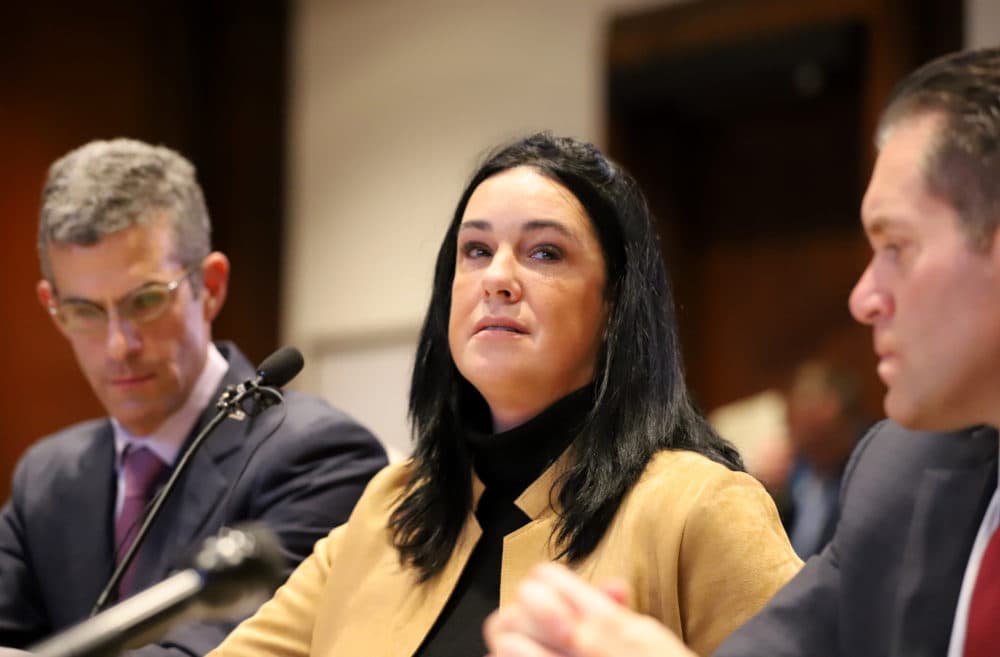Advertisement
'Conrad's Law' Pitched As Way To Avert Tragedies

Massachusetts is one of only eight states without a statute explicitly criminalizing coercion of suicide, a gap that lawmakers hope to close in the wake of high-profile cases.
A bill discussed before the Judiciary Committee on Tuesday would create a new charge for intentionally encouraging or enabling a suicide attempt, punishable by up to five years imprisonment. Authors and supporters dubbed the legislation "Conrad's Law" in reference to Conrad Roy, a Massachusetts teen who died by suicide in 2014 following repeated encouragement from his girlfriend, Michelle Carter.
Sen. Barry Finegold, one of the bill's authors, told colleagues that the measure would "save lives" as youth suicide rates continue to increase and as technology exacerbates the effects of social isolation and bullying.
"We hope this bill serves two important purposes," Finegold, who co-filed the bill with Rep. Natalie Higgins, told reporters after testifying at a committee hearing. "First, it will close the gap in Massachusetts law by making it illegal to coerce someone you know is vulnerable into suicide. Second, it will send a clear message that this behavior is not only unacceptable, but criminal."
Supporters stressed that the legislation has a narrow focus and would not apply to any unintentional effects from bullying, negligence or jokes. Individuals could only face charges if they knew or had cause to know someone had expressed suicidal thoughts, then knowingly suggested suicide.
One provision of the bill would apply the same punishment to anyone who exercises "substantial control" over another person through manipulation or "undue influence whereby the will of one person is substituted for the wishes of another."
Asked about criticism that the section in question was too vague and open to interpretation, Finegold said the language had been crafted only to apply to intentional coercion of someone who has displayed suicidal thoughts.
The bill would also explicitly ban providing means for suicide, while exempting any lawful medical treatments administered by licensed physicians.
In addition to Roy, several other incidents have surfaced in Massachusetts in recent years involving teenagers and young adults who were encouraged to harm themselves. Last month, a grand jury indicted Inyoung You on involuntary manslaughter charges for allegedly encouraging her boyfriend, Alexander Urtula, to die by suicide.
Advertisement
Lynn Roy, Conrad's mother, joined lawmakers in support of the legislation Tuesday, where she said she was seeking the additional protections not as justice for her case but as a guardrail to protect other families from experiencing similar tragedy.
"This is the only way I can honor him," Roy said of her son.
Under current law, defendants could be face involuntary manslaughter charges, but authors and supporters said a unique, separate charge for coercing suicide would apply more directly and would lead to fewer legal appeals. Carter, Roy's former girlfriend, was convicted of involuntary manslaughter in 2017, and the Supreme Judicial Court in February upheld the lower court's ruling.
Northeastern University School of Law professor Daniel Medwed said manslaughter charges are "a hammer when a scalpel would be more appropriate," and he added that a clear ban on pushing a vulnerable victim toward suicide would help prevent future cases.
"We're not punishing words alone," Medwed told the committee. "We're punishing words that recklessly cause someone else's death."
Higgins said the legislation complements other initiatives aimed at improving mental health and supporting healthy relationships, particularly with suicide rates — now the second leading cause of death for Americans between 15 and 19, according to the Centers for Disease Control — on the rise.
"This is just one piece of it," she said. "We have to make sure we have more mental health resources for our youth, especially in more rural communities and central and western Massachusetts and the Cape."
Resources: You can reach the National Suicide Prevention Lifeline at 1-800-273-TALK (8255) and the Samaritans Statewide Hotline at 1-877-870-HOPE (4673).
This article was originally published on November 12, 2019.